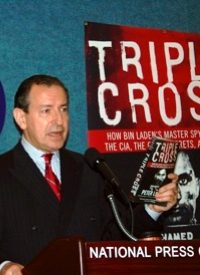
As noted here in our previous post on June 15, in October 2007, U.S. Attorney Patrick Fitzgerald threatened to sue author Peter Lance and his publisher, HarperCollins, for defamation unless the publisher ceased publication and distribution, issued a public retraction of the book’s allegations about Fitzpatrick, and agreed to refrain from publishing a scheduled updated edition of the book. Following an extensive, 18-month process of re-vetting the evidence in Lance’s book, HarperCollins decided to go ahead with publication of the updated version of Triple Cross.
On June 13, Peter Lance filed a complaint with the Department of Justice Office of Professional Responsibility requesting an investigation of Fitzgerald’s attempts "to use the authority of his office to intimidate me and my publisher."
In his complaint, Lance asked the OPR to investigate "the twenty (20) month campaign
by Patrick Fitzgerald, U.S. Attorney for the Northern District of Illinois, to kill the hardcover and paperback editions of my HarperCollins (HCP) investigative book Triple Cross."
Mr. Lance’s complaint continues:
As you’ll see from the thirty-two (32) pages of letters sent by Mr. Fitzgerald from October 2007 to June 2009, he has attempted to use the authority of his office to intimidate me and my publisher; threatening repeatedly to sue for defamation and other relief if we did not stop publication of the book, which was critical of Mr. Fitzgerald’s performance in office.
On November 16, 2007, Fitzgerald sent HarperCollins a 16-page "demand" letter, using the fax machine of the U.S. Attorney office in Chicago. "I believe," Lance says in his complaint, "that Mr. Fitzgerald’s intent in using Dept. of Justice resources to send a letter purporting to press his personal claim, was a clear attempt to intimidate me and chill my publisher."
Lance, a five-time Emmy award-winning investigative reporter, has produced in Triple Cross a carefully researched and meticulously documented bombshell that threatens to explode the careers of current and former high-level government officials who are culpable of negligence and/or malfeasance (and in some cases much worse) in relation to some of the most important terrorist attacks on the United States over the past two decades. It represents an enormous multi-year investigative effort by Peter Lance to connect the dots, showing the important linkages tying together several of the most important terrorist attacks on America: the 1990 assassination of Rabbi Meier Kahane, the 1993 World Trade Center bombing, and the 1998 U.S. Embassy bombings in Kenya and Tanzania. Ali Mohamed played a key role in all of these cases — and others besides. Lance is one of the few investigative journalists from the mainstream media to delve into the abundant evidence (which The New American covered extensively over a period of years) showing the connections of Ali Mohamed and convicted 1993 World Trade Center bomber Ramzi Yousef to the 1995 Oklahoma City bombing.
Instead of investigating this evidence, the federal government has gone to great lengths to bury it. Patrick Fitzgerald’s lawsuit threat appears to be the latest effort in this ongoing cover-up. The republication of Triple Cross is an important milestone in exposing a major part of the untold story of the 9/11 terror attacks. This is a top "must read" book on terrorism and national security. Get your copy now. Although Lance and HarperCollins have managed to get this book published, it is still possible that Fitzgerald and others in positions of power with similar interests in keeping its contents buried may yet succeed in killing it.
Photo of Peter Lance: Jim Capo
Related articles:



